Best AI tools for< Run Prequantized Models >
20 - AI tool Sites

NVIDIA Run:ai
NVIDIA Run:ai is an enterprise platform for AI workloads and GPU orchestration. It accelerates AI and machine learning operations by addressing key infrastructure challenges through dynamic resource allocation, comprehensive AI life-cycle support, and strategic resource management. The platform significantly enhances GPU efficiency and workload capacity by pooling resources across environments and utilizing advanced orchestration. NVIDIA Run:ai provides unparalleled flexibility and adaptability, supporting public clouds, private clouds, hybrid environments, or on-premises data centers.

Run Recommender
The Run Recommender is a web-based tool that helps runners find the perfect pair of running shoes. It uses a smart algorithm to suggest options based on your input, giving you a starting point in your search for the perfect pair. The Run Recommender is designed to be user-friendly and easy to use. Simply input your shoe width, age, weight, and other details, and the Run Recommender will generate a list of potential shoes that might suit your running style and body. You can also provide information about your running experience, distance, and frequency, and the Run Recommender will use this information to further refine its suggestions. Once you have a list of potential shoes, you can click on each shoe to learn more about it, including its features, benefits, and price. You can also search for the shoe on Amazon to find the best deals.

Practice Run AI
Practice Run AI is an online platform that offers AI-powered tools for various tasks. Users can utilize the application to practice and run AI algorithms without the need for complex setups or installations. The platform provides a user-friendly interface that allows individuals to experiment with AI models and enhance their understanding of artificial intelligence concepts. Practice Run AI aims to democratize AI education and make it accessible to a wider audience by simplifying the learning process and providing hands-on experience.

Dora
Dora is a no-code 3D animated website design platform that allows users to create stunning 3D and animated visuals without writing a single line of code. With Dora, designers, freelancers, and creative professionals can focus on what they do best: designing. The platform is tailored for professionals who prioritize design aesthetics without wanting to dive deep into the backend. Dora offers a variety of features, including a drag-and-connect constraint layout system, advanced animation capabilities, and pixel-perfect usability. With Dora, users can create responsive 3D and animated websites that translate seamlessly across devices.

Reflect
Reflect is an AI-powered test automation tool that revolutionizes the way end-to-end tests are created, executed, and maintained. By leveraging Generative AI, Reflect eliminates the need for manual coding and provides a seamless testing experience. The tool offers features such as no-code test automation, visual testing, API testing, cross-browser testing, and more. Reflect aims to help companies increase software quality by accelerating testing processes and ensuring test adaptability over time.
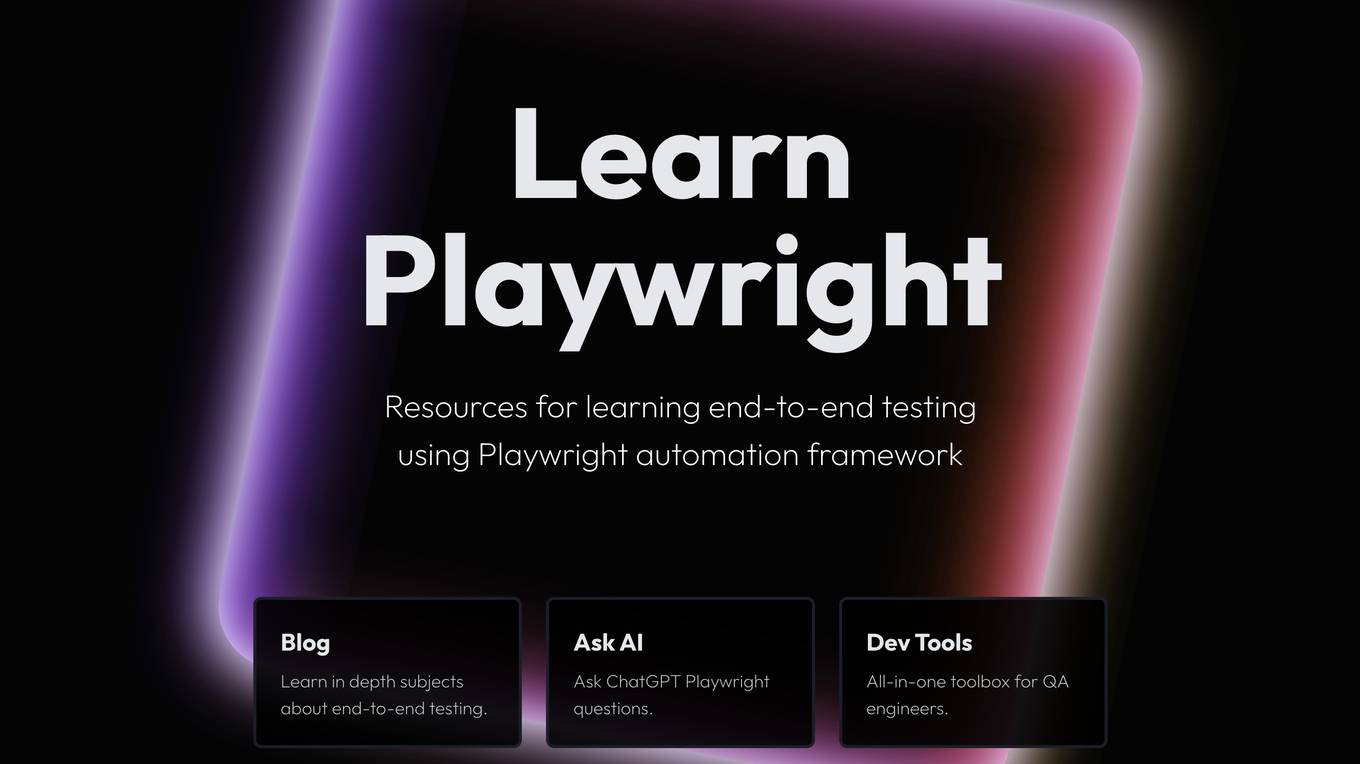
Error Handling Application
The website is currently experiencing an application error, indicating a server-side exception. Users encountering this error are advised to check the server logs for more information. The error digest number provided is 3308662818.
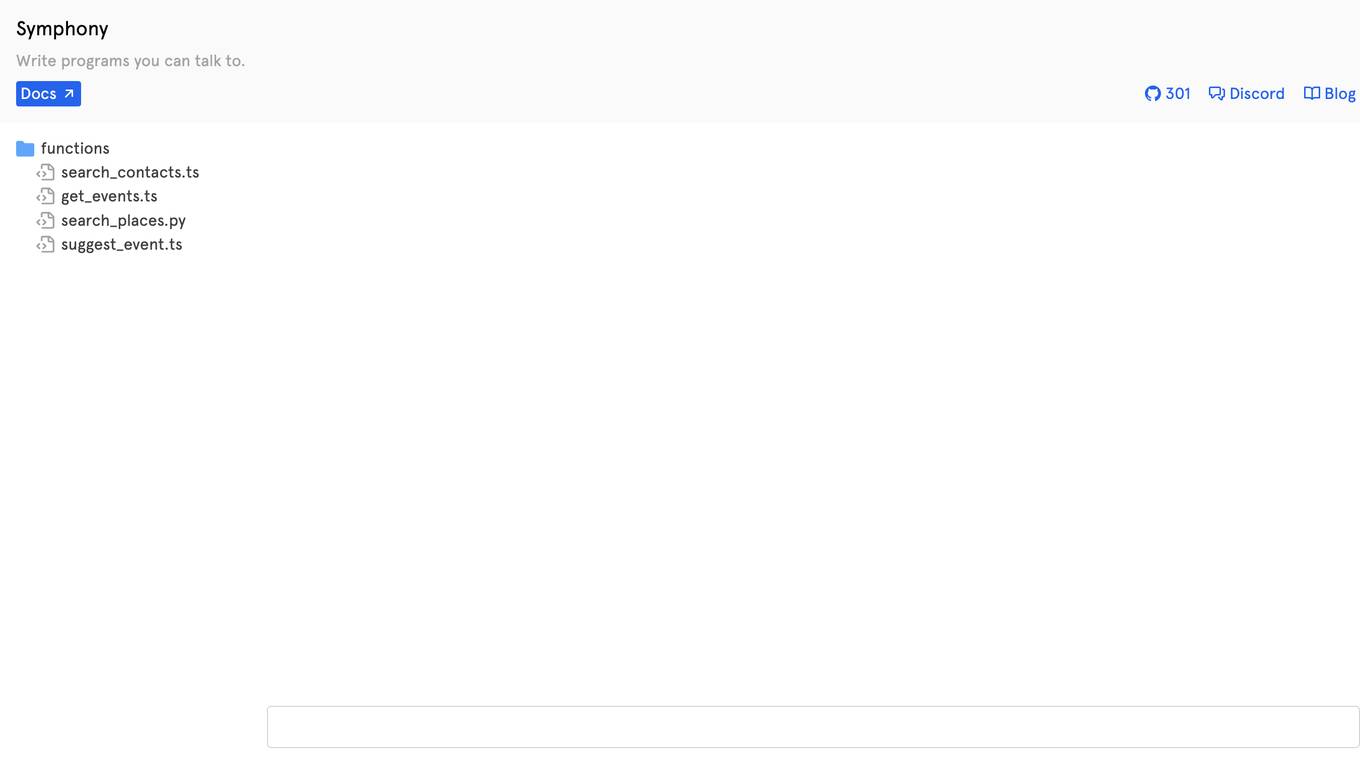
Symphony
Symphony is a platform that allows users to write programs using natural language. It enables users to interact with the system by talking to it, making programming more accessible and intuitive. Symphony simplifies the process of coding by translating spoken commands into executable code, providing a user-friendly programming experience.

aify
aify is an AI-native application framework and runtime that allows users to build AI-native applications quickly and easily. With aify, users can create applications by simply writing a YAML file. The platform also offers a ready-to-use AI chatbot UI for seamless integration. Additionally, aify provides features such as Emoji express for searching emojis by semantics. The framework is open source under the MIT license, making it accessible to developers of all levels.
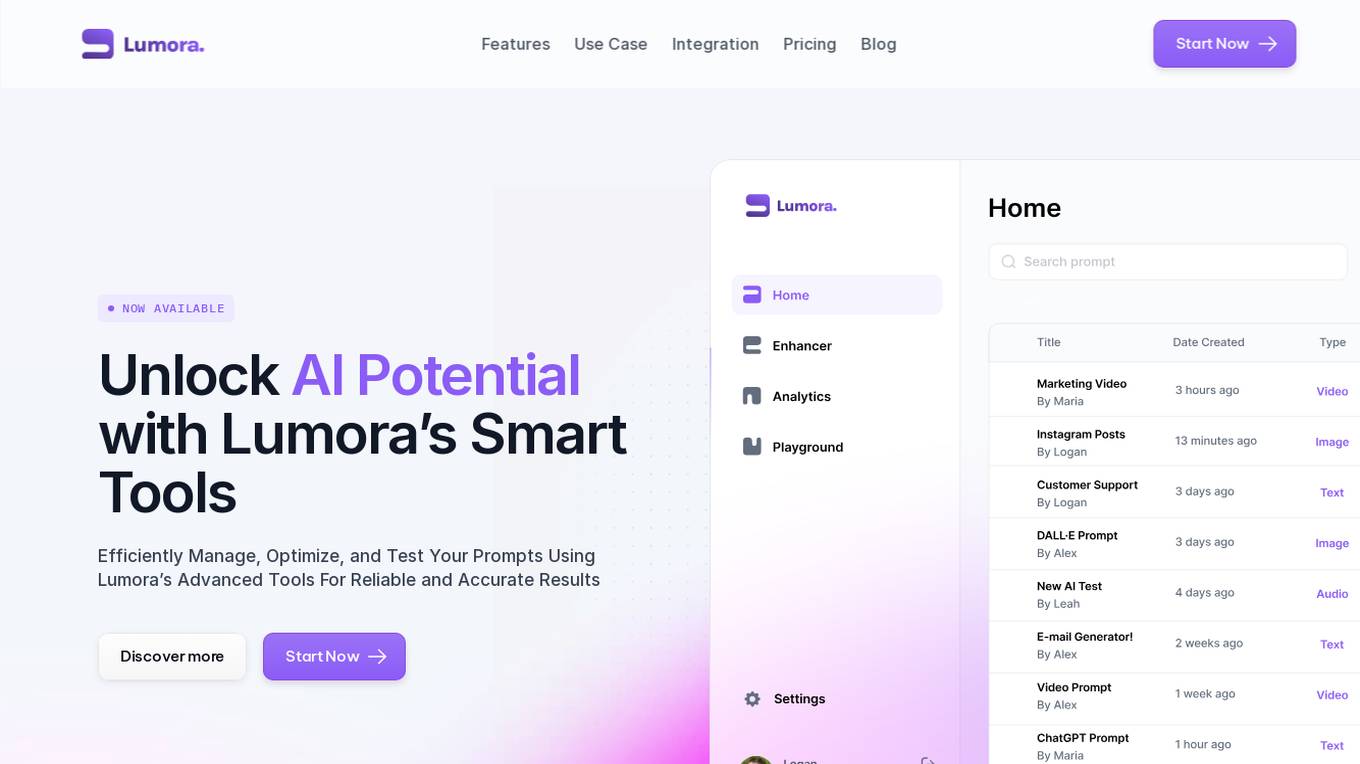
Lumora
Lumora is an AI tool designed to help users efficiently manage, optimize, and test prompts for various AI platforms. It offers features such as prompt organization, enhancement, testing, and development. Lumora aims to improve prompt outcomes and streamline prompt management for teams, providing a user-friendly interface and a playground for experimentation. The tool also integrates with various AI models for text, image, and video generation, allowing users to optimize prompts for better results.

Dora
Dora is an AI-powered platform that enables users to create 3D animated websites without the need for coding. It caters to designers, freelancers, and creative professionals who seek to design visually captivating websites effortlessly. With Dora, users can craft mesmerizing 3D and animated visuals that are responsive and seamlessly translate across devices. The platform is designed for professionals who prioritize design aesthetics and offers a no-code experience for those transitioning from other design tools. Dora leverages advanced AI algorithms to generate, customize, and deploy stunning landing pages, revolutionizing the web design process.
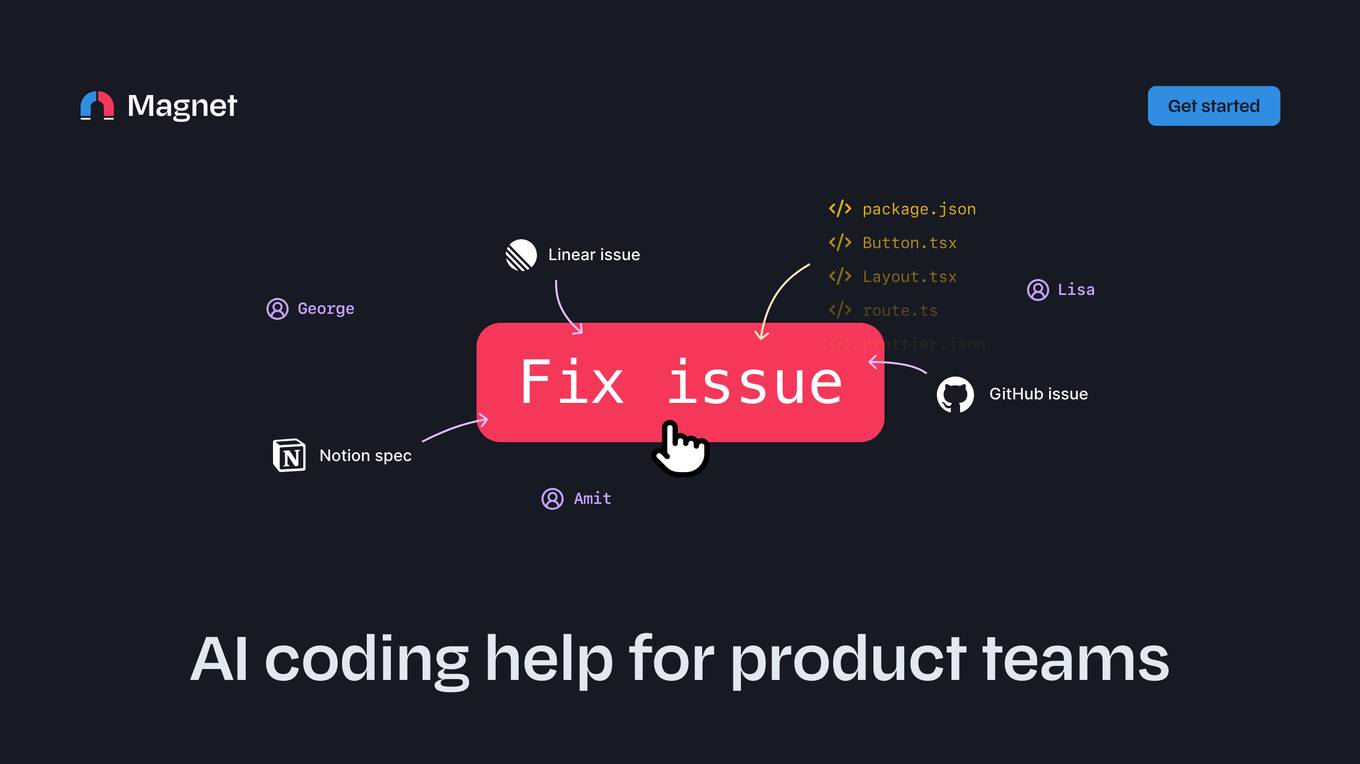
Magnet
Magnet is an AI coding assistant that helps product teams fix issues, share AI threads, and organize projects. It integrates with Linear, GitHub, and Notion, and provides auto-suggested files and code files for personalized and accurate AI recommendations. Magnet also offers prompt templates to help users get started and suggests quick fixes for bugs or enhancements.

Devath
Devath is the world's first AI-powered SmartHome platform that revolutionizes the way users interact with their smart devices. It eliminates the need for writing extensive lines of code by allowing users to simply give instructions to the AI for seamless device control. With features like splash resistance and responsive design, Devath offers a user-friendly experience for managing smart home functionalities. The platform also enables developers to preview and test their apps before submission, providing a 99% faster publishing process. Devath is continuously evolving with user feedback and aims to enhance the SmartHome experience through AI copilots and customizable features. With Devath, users can control their devices from the web and enjoy free unlimited access to the AI era of SmartHome.
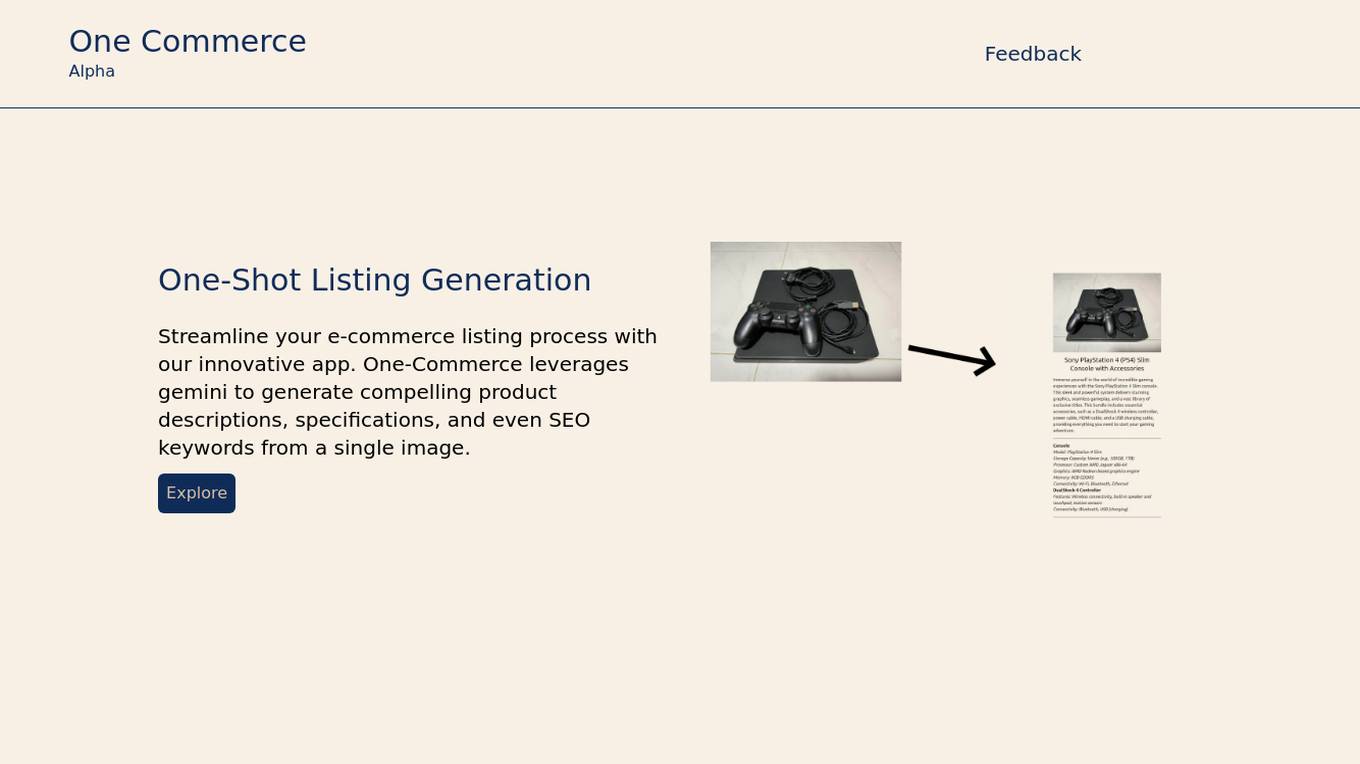
One-Commerce
One-Commerce is an AI-powered application designed to streamline the e-commerce listing process. It utilizes gemini technology to automatically generate detailed product descriptions, specifications, and SEO keywords from a single image. With its innovative approach, One-Commerce aims to simplify and enhance the online selling experience for e-commerce businesses.

Sessions
Sessions is a cloud-based video conferencing and webinar platform that offers a range of features to help businesses run successful online meetings and events. With Sessions, users can create interactive agendas, share screens, record meetings, and host webinars with up to 1000 participants. Sessions also integrates with a variety of third-party tools, including Google Drive, Dropbox, and Slack, making it easy to collaborate with colleagues and share files. Additionally, Sessions offers a number of AI-powered features, such as automatic transcription and translation, to help users get the most out of their meetings.

CALA
CALA is a leading fashion platform that unifies design, development, production, and logistics into a single, digital platform. It provides tools and support to automate and optimize the supply chain from start to finish. CALA also offers a network of designers and suppliers, as well as AI-powered design tools to help generate moodboards, fresh ideas, and more.
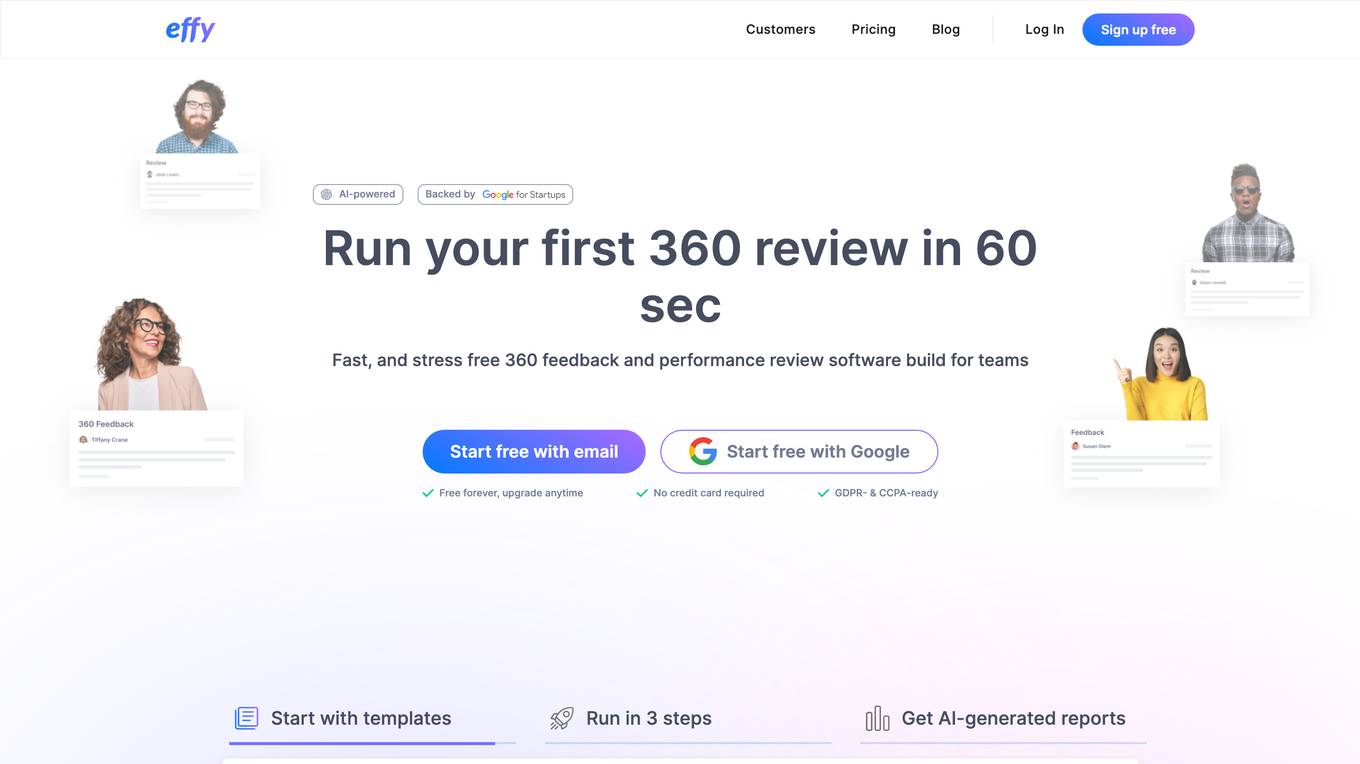
Effy AI
Effy AI is a free performance management software for teams. It is AI-powered and backed by Run your first 360 review in 60 sec. Fast, and stress-free 360 feedback and performance review software build for teams. With Effy AI, you can collect reviews from different sources such as self, peer, manager, and subordinate evaluations. The platform goes even further by allowing employees to suggest particular peers and seek approval from their manager, giving them a voice in their reviews. Effy AI uses cutting-edge artificial intelligence to carefully process reviewers' answers and generate comprehensive reports for each employee based on the review responses.

Blobr
Blobr is an AI tool designed to help users run Google Ads like a pro. It provides access to an AI twin of a Google Ads expert, trained to understand the user's business and apply winning strategies. Trusted by over 100 industry leaders and agencies, Blobr offers deep analysis, constant testing, and ruthless prioritization of Google Ads campaigns in real-time. The AI twin replicates the methodologies of Google Ads experts, providing deep understanding, same expert processes, and better coverage for campaign monitoring. Users can easily turn their campaigns into pro-mode by sharing business goals, connecting ad data, letting the AI twin analyze performance, receiving weekly insights, and applying optimizations with ready-to-use bulk edit files.
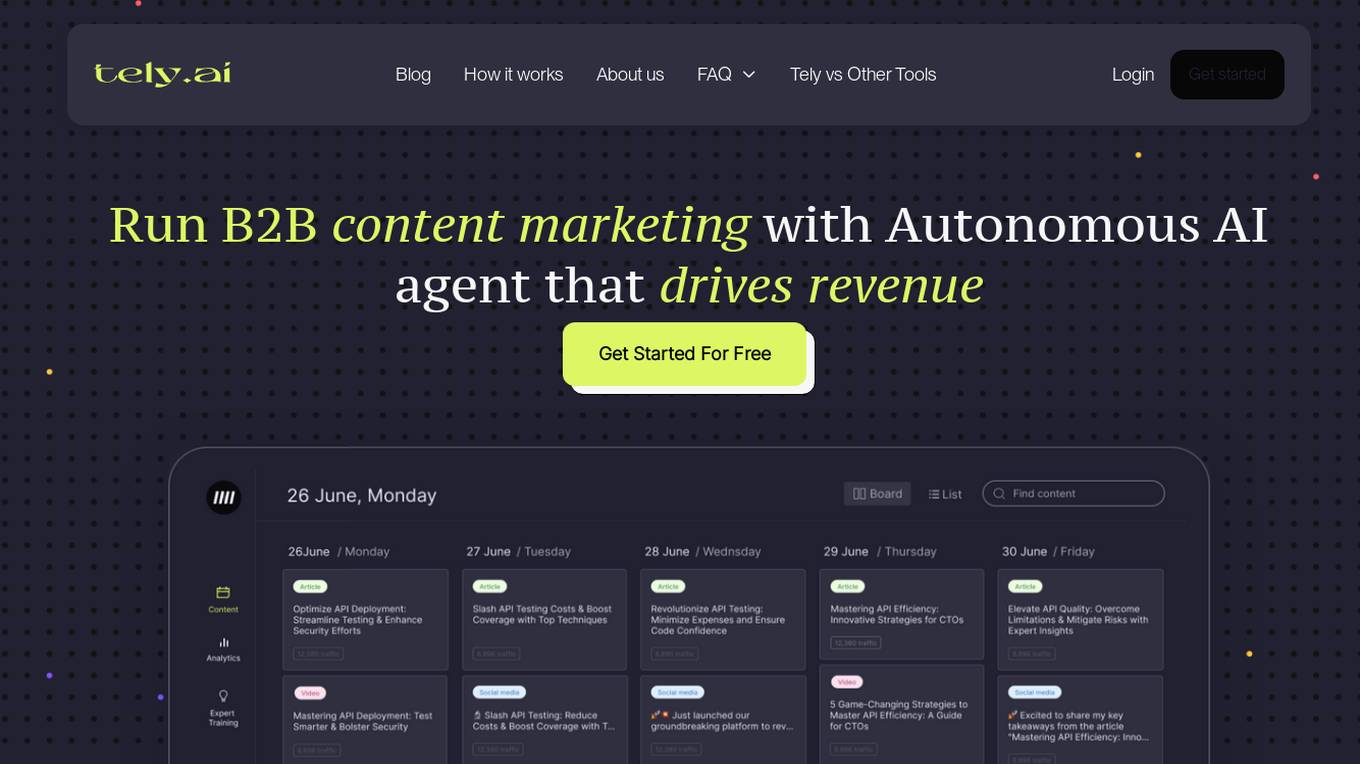
Tely
Tely is an autonomous AI agent that helps businesses run B2B content marketing. It uses machine learning to understand your product, build domain expertise, run SEO optimization, and create a content plan. Tely can also personalize your content with infographics, code snippets, experts' quotes, and call to actions. With Tely, you can drive sales with expert-level content on autopilot, reduce customer acquisition cost, increase conversion rate, and save money on marketing expenses.
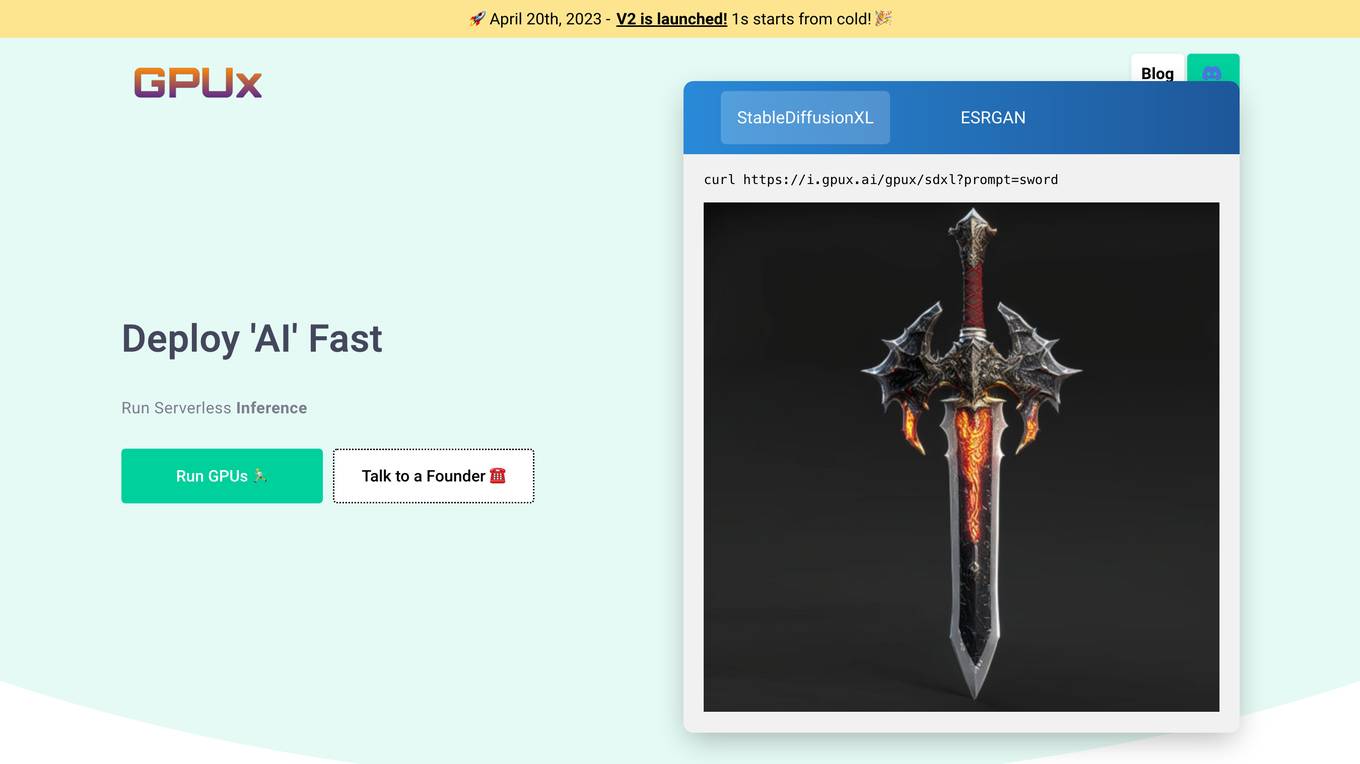
GPUX
GPUX is a cloud platform that provides access to GPUs for running AI workloads. It offers a variety of features to make it easy to deploy and run AI models, including a user-friendly interface, pre-built templates, and support for a variety of programming languages. GPUX is also committed to providing a sustainable and ethical platform, and it has partnered with organizations such as the Climate Leadership Council to reduce its carbon footprint.

Lemon Squeezy
Lemon Squeezy is an all-in-one platform designed for software companies to handle payments, subscriptions, global tax compliance, fraud prevention, and more. It offers features like global tax compliance, borderless SaaS payments, instant payment methods, local currency support, AI fraud prevention, and failed payment recovery. The platform also provides tools for ecommerce, marketing, reporting, and developer integration. Lemon Squeezy aims to simplify running a software business by offering a comprehensive solution for various business needs.
1 - Open Source AI Tools
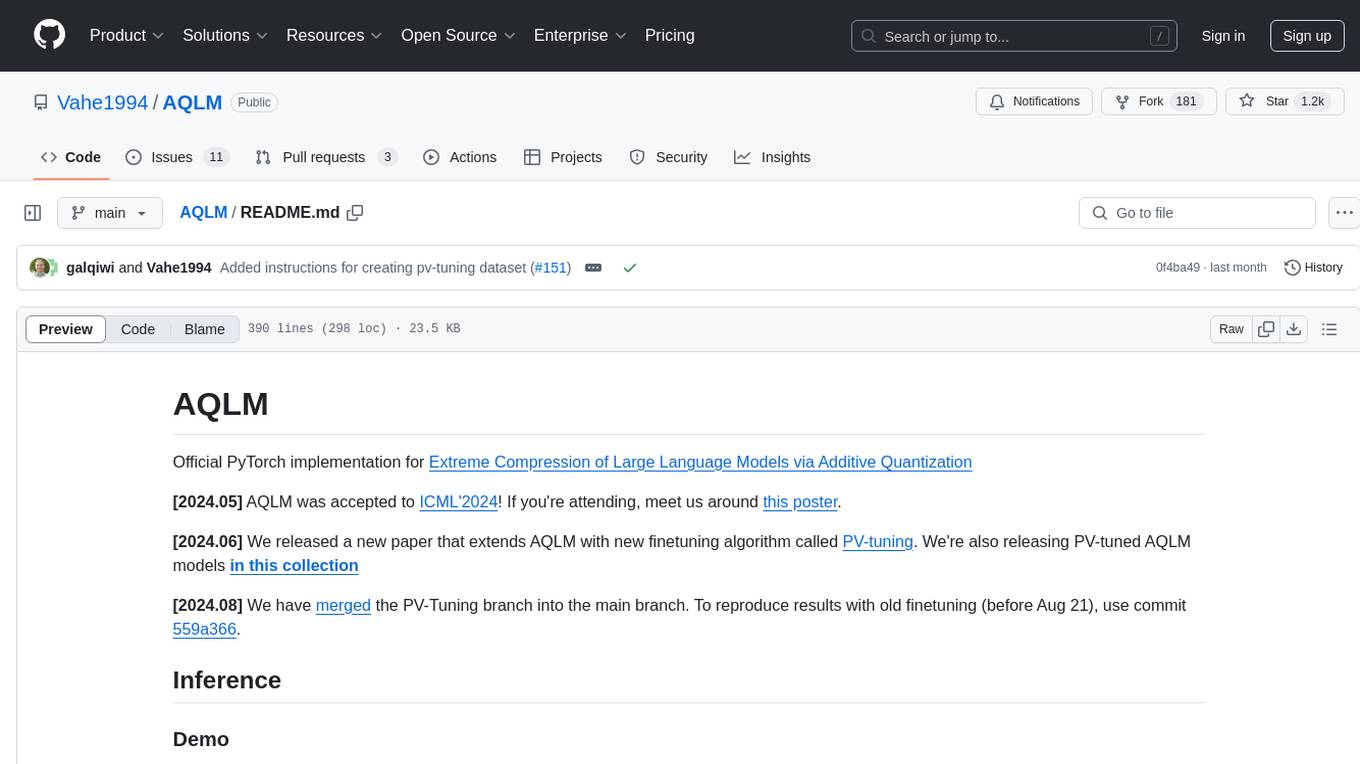
AQLM
AQLM is the official PyTorch implementation for Extreme Compression of Large Language Models via Additive Quantization. It includes prequantized AQLM models without PV-Tuning and PV-Tuned models for LLaMA, Mistral, and Mixtral families. The repository provides inference examples, model details, and quantization setups. Users can run prequantized models using Google Colab examples, work with different model families, and install the necessary inference library. The repository also offers detailed instructions for quantization, fine-tuning, and model evaluation. AQLM quantization involves calibrating models for compression, and users can improve model accuracy through finetuning. Additionally, the repository includes information on preparing models for inference and contributing guidelines.
20 - OpenAI Gpts

Consulting & Investment Banking Interview Prep GPT
Run mock interviews, review content and get tips to ace strategy consulting and investment banking interviews

Dungeon Master's Assistant
Your new DM's screen: helping Dungeon Masters to craft & run amazing D&D adventures.

Database Builder
Hosts a real SQLite database and helps you create tables, make schema changes, and run SQL queries, ideal for all levels of database administration.

Restaurant Startup Guide
Meet the Restaurant Startup Guide GPT: your friendly guide in the restaurant biz. It offers casual, approachable advice to help you start and run your own restaurant with ease.

Community Design™
A community-building GPT based on the wildly popular Community Design™ framework from Mighty Networks. Start creating communities that run themselves.

Code Helper for Web Application Development
Friendly web assistant for efficient code. Ask the wizard to create an application and you will get the HTML, CSS and Javascript code ready to run your web application.

Creative Director GPT
I'm your brainstorm muse in marketing and advertising; the creativity machine you need to sharpen the skills, land the job, generate the ideas, win the pitches, build the brands, ace the awards, or even run your own agency. Psst... don't let your clients find out about me! 😉

Pace Assistant
Provides running splits for Strava Routes, accounting for distance and elevation changes
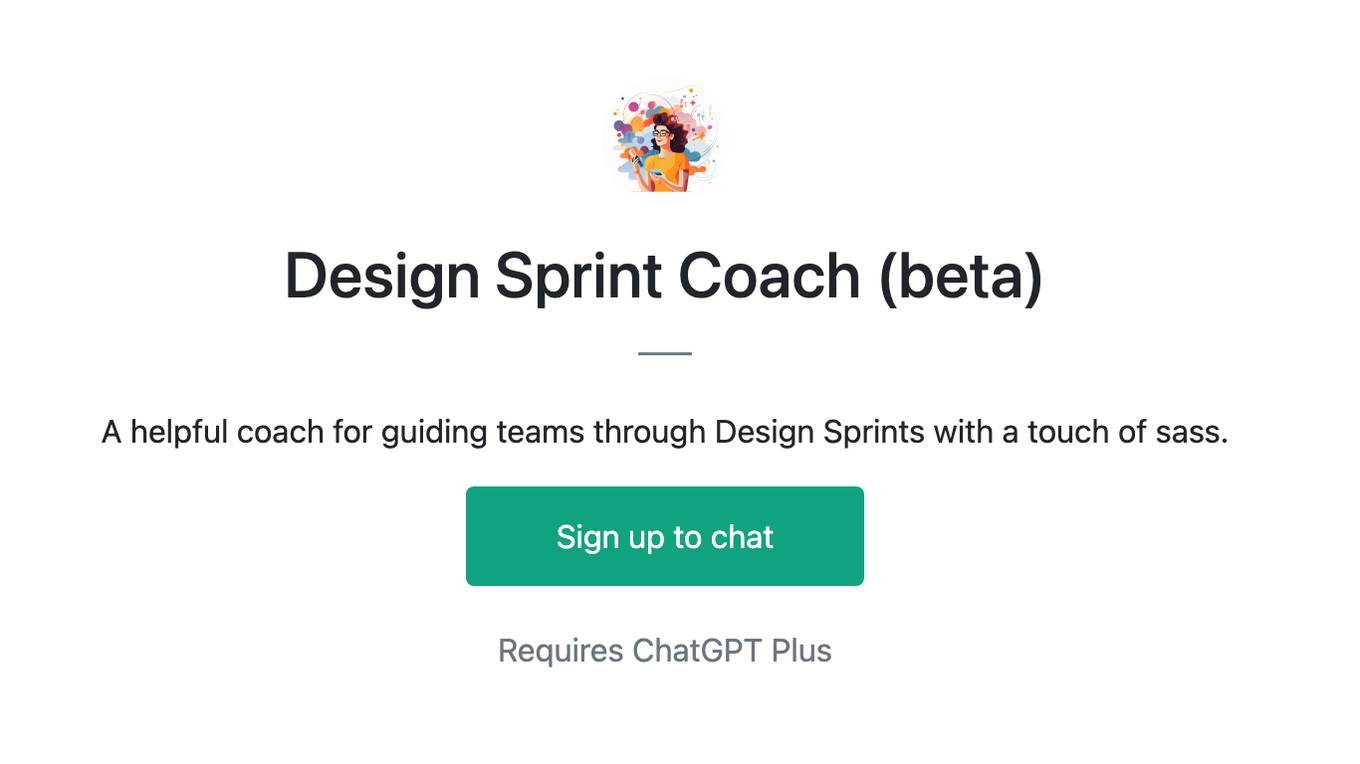
Design Sprint Coach (beta)
A helpful coach for guiding teams through Design Sprints with a touch of sass.








